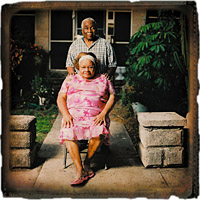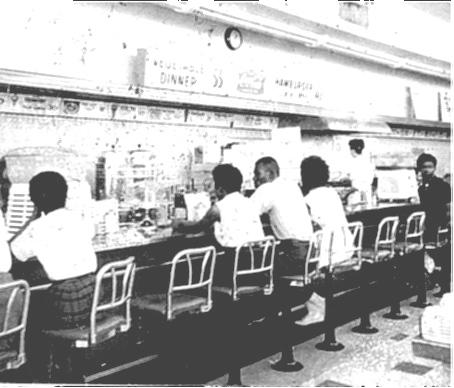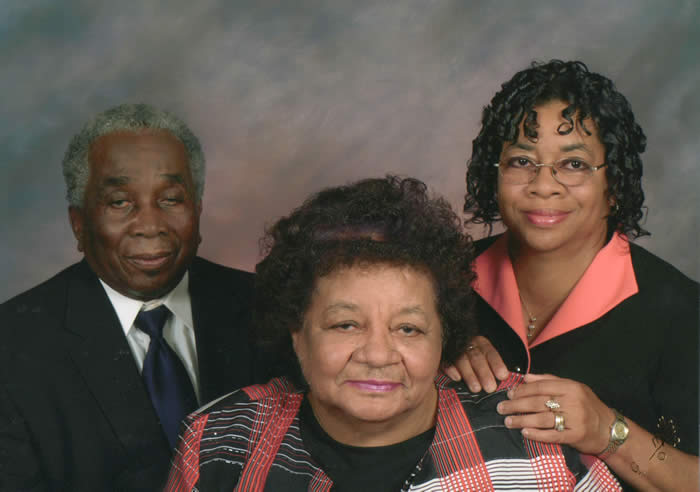The James & Hattie White Family - "It Was a Family Affair"
 "Mama, if you sign me out now, we'll never get anywhere as black people. Let me stay in jail." With these words, Sam White, just 14 years old, set the standard for courage for the White family, He had begged his family not to 'save him' from jail for his act of civil disobedience-- asking to be served a hamburger and a coke at a public lunch counter. For Hattie and James White, it was to be a test of their courage beyond what any parent should ever have to face. They had to deny the instinctive parental need to protect their child in order to allow him to forge a better future for himself and other black children.
"Mama, if you sign me out now, we'll never get anywhere as black people. Let me stay in jail." With these words, Sam White, just 14 years old, set the standard for courage for the White family, He had begged his family not to 'save him' from jail for his act of civil disobedience-- asking to be served a hamburger and a coke at a public lunch counter. For Hattie and James White, it was to be a test of their courage beyond what any parent should ever have to face. They had to deny the instinctive parental need to protect their child in order to allow him to forge a better future for himself and other black children.
A few days before, July 1963, sixteen young blacks, including seven juveniles, had staged a sti-in at Woolworth's on King St. All were jailed, but the local judge, Charles Mathis, informed the parents of the juveniles that he would release their children to the parent's custody if they would sign a pledge to keep them away from all further demonstrations. The parents of three of the children did so. But all four of the other children, "The St. Augustine Four," told their parents not to sign, that they were willing to go to jail and that they needed to make this stand for their rights, for their own futures. T hese four sets of parents somehow found the courage to let their children make this great sacrifice.
hese four sets of parents somehow found the courage to let their children make this great sacrifice.
But neither the parents nor the children knew that the children were not going to be kept in the local jail, as expected, but would be sent to state reform schools in distant cities. The Whites said, "Judge Mathis had told them during the hearing that he would send them to reform school. He said they broke the law, but he never said that he would send them if we didn's sign that pledge. We all believed he was going to sentence them to jail; that our children would be here in town where we could keep an eye on them. That was the impression he left us with." Mrs. White's mother had been taking breakfast to the children early each morning as they didn't like the jail food.
But one morning she arrived with the meal and the children were gone, all four and noone could or would tell her where they were. She hurried to the dry cleaners where Mrs. Hattie White was employed. Hattie left work, tried to find out from the jail personnel where her son was, and finally went to Dr. Hayling to ask advice. He suggested they go to Fred Brinkhoff, Jr., the juvenile officer, who said he knew nothing and to come back tomorrow. But on the morrow, he told the distraught parents he could not help them--he could not even tell them where their children were. "My hands are tied," he said. "You have to see Judge Mathis." Refusing at first to tell the parents anything, Judge Mathis finally told them that the two girls had been sent to a state facility in Ocala and the two boys to the reform school in Marianna. He also said he no longer had any jurisdiction over the case and could not get them back. The four children remained in reform school until January 1964.
"We had no Christmas that year," Hattie White said. "We could not celebrate with Sam in that place." The sacrifice that Sam and the other 3 youngsters made was not in vain. The terrible injustice of their incarceration served to galvanize the community and was the catalyst that launched the major civil rights demonstrations in St. Augustine. For the White family, their ordeal was just beginning. Every member of their family was involved in one way or another in the struggle for civil rights. Their children were in the first group to integrate the St. Johns County Schools. The youngest, Walter Eugene (Gene) entered the Orange Street Elementary. He was nine years old. Their twin girls, Janice and Jeannette, aged 12, along with Christopher, aged 13, intergrated Ketterlinus Junior High School, where they were subjected to frequent verbal and physical abuse. Christopher in particular suffered beatings at the hands of fellow students. Appeals to the principal, Mr. Yates, to provide protection for their children were met with the statement that he was too busy to be involved with the security of students at his school. One day, a grown man, a Mr. Good, came onto the campus and severely beat Christopher. The Whites were not even notified of his injuries, They knew nothing until they saw him when he came home. They pressed charges against Mr. Goode and he was sentenced to six months in jail by Judge Grier. The children continued to suffer abuse from their fellow students. And again, Hattie and James White had to be brave enough to let them remain at the school.
 Bravery was nothing new to James White. He was a veteran of World War II, serving in the Italian theater from 1942 to 1946. During his service he was awarded two bronze stars, a purple heart, the World War II Victory medal, and the Combat Infantry Badge. Mustered out in 1946, after fighting for the freedom of the European people, he returned to his native South Carolina; to a land that would not let him be served a hamburger in a public place, nor drink from a public fountain nor compete for jobs he was fully capable of doing. When the civil rights demonstrations began in St. Augustine. James White took part almost every night in the marches and sit-ins at the local restaurants and took part in every legal deomstoration he could. He was physically and mentally abused, stung with cattle prods, and went to jail on a regular basis. All to secure for his family the same freedoms that he had risked his life in Italy to secure for others. Hattie White was working at the Zoric Dry Cleaners when the demonstrations began. Like every other business in town at that time, working conditions were segregated. There were separate water fountains and separate restrooms. One day, the water fountain for the black workers was broken. A white co-worker offered to take Hattie's cup and get her some water from the white fountain. "No," Hattie said. "...you just move out of the way and I'll get my own water." She did and was sent home and docked a half-day's pay for her action.
Bravery was nothing new to James White. He was a veteran of World War II, serving in the Italian theater from 1942 to 1946. During his service he was awarded two bronze stars, a purple heart, the World War II Victory medal, and the Combat Infantry Badge. Mustered out in 1946, after fighting for the freedom of the European people, he returned to his native South Carolina; to a land that would not let him be served a hamburger in a public place, nor drink from a public fountain nor compete for jobs he was fully capable of doing. When the civil rights demonstrations began in St. Augustine. James White took part almost every night in the marches and sit-ins at the local restaurants and took part in every legal deomstoration he could. He was physically and mentally abused, stung with cattle prods, and went to jail on a regular basis. All to secure for his family the same freedoms that he had risked his life in Italy to secure for others. Hattie White was working at the Zoric Dry Cleaners when the demonstrations began. Like every other business in town at that time, working conditions were segregated. There were separate water fountains and separate restrooms. One day, the water fountain for the black workers was broken. A white co-worker offered to take Hattie's cup and get her some water from the white fountain. "No," Hattie said. "...you just move out of the way and I'll get my own water." She did and was sent home and docked a half-day's pay for her action.
When Sam disappeared, she left work to search for him. For this, she was fired from her job. When the nightly marches began, Hattie White was right there, along with sons, James, Jr. and Christopher. Her first time to be arrested and jailed, however, was not during one of the night marches. She led a group of teenagers to Marty's Seafood Restaurant, on US Hwy 1, on a sit-in. When the police came, they handled her roughly, banging her head on the car door as they pushed her inside. When she complained of the headache it gave her, the officer told her it was her own fault for causing such trouble. Taken to jail, she found herself in the company of a number of women crowded into the small cell, most of whom had been arrested the night before when marching. She shared the cell with Mrs. Peabody, the mother of the governor of Massachusetts, Kat Twine, Nellie Mitchell, Annie Mitchell, and Hattie'ssister, Vertell Duncan, as well as others, including a very elderly woman. Despite the overcrowding, they had to remain in the cell all day and all night because the exercise yard where they might have gone in the daytime was completely full of teenagers who were arrested for marching. Mrs. White spent a week in the jail that time. Her second jailing only lasted a day and a half.
She continued to march every night until the night that thugs smoke bombed the White's home. The younger children were inside. The house filled with thick black smoke; they were frightened. Mrs. White stayed home some nights with them after that. She took them to her mother's home when she did join the marches. The smoke bombs had been stolen from the Fairchild Aircraft plant, where James White worked, but the thieves were never identified. Because the plant did government contract work, Jame's job was safe. He could not be fired for demonstrating. But even there, discrimination was the norm. There were usual separate water fountains and toilets, and even a separate door that blacks had to use to enter the facility. Blacks were restricted to the lowest paying jobs. But, at least his job was protected.
Hattie White's brother, Sam, was not so fortunate. He worked for the Ponce Golf Course. Sheriff L.O. Davis saw Sam at one of the demonstrations and told his employers. He was promptly fired and like so many other demonstrators. There were no jobs available in town and he had to leave. For Sam, it proved to be a lucky break; he moved north where he had the opportunity to become a professional golfer and a member of the PGA.
James' first arrest came as a result of a sit-in Easter weekend at the cafe across the street from Government House. He and the others with him had to remain in jail the whole weekend, as no judges were available. It was Monday morning before Tobias Simon, a lawyer and civic activist from Miami, could find a judge and secure his release. His second arrest took place on the plaza where he and others were holding a 'service' in front of the Bandstand. This time he felt the sting of the cattle prods as he was taken to jail.
At one point, five members of the White family were in jail at the same time; all for participating in the legal demonstrations for civil rights. Besides Hattie and James, Sr., James, Jr., (a student at Richard J Murray High School), and Christopher wre also in the local jail, and Sam was still in reform school.
One day, a white woman from New Jersey, a Mrs. Canright, came to the White home and asked Hattie and James if they would allow her to take the twin girls, Janice and Jeannette with her on Sunday morning to try to attend a service at the First Methodist Church on King St. She asked if they had, "pretty white dress-up dresses," and asked that they wear them. She wanted them to be in their "Sunday best" clothes. The next Sunday, as Mrs. Canright and the twins mounted the steps of the church, they were met with a solid wall of people, refused entrance, and were pushed back off the steps and onto the sidewalk beside the street. Passerbys hurled insults and rocks at them. The girls returned home physically unharmed, but emotionally distraught. Once again, the members of the White family had put their courage to the test and passed.
Every member of the Hattie and James White family put their hearts, minds, and bodies on the front lines of the battle to secure their own rights and the rights of future generations. After the passage of the Civil Rights Act of 1964 in June of that year, Hattie was called back to her old job at the dry cleaners. This time, there were no "Whites only" signs at the toilets and water fountains. The same quick changes were made at Fairchild Aircraft Plant, and in time, better jobs opened up for blacks, but were not free of racial discrimination.
For their strength and courage, and by their example, the White family helped to secure a better life for themselves and for the entire community. When asked where had she found the courage to face down the entrenched system of bigotry and hatred, to risk physical injury to herself and her children, to allow her children to help shape their own futures, and the futures of others, Hattie White replied, "From Sam. He showed me what courage is, and I had to follow him."
Shirley Bryce of 40th ACCORD, Inc.
— Copyright © 2004,The 40th ACCORD, Inc.
